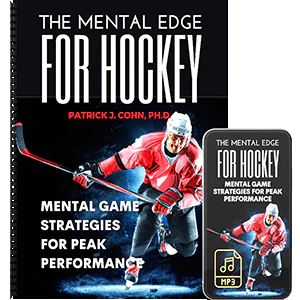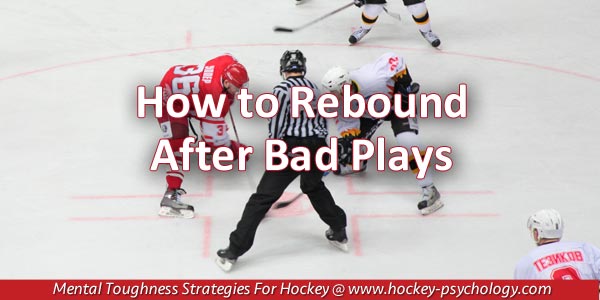How Top Players Refocus After a Bad Play
Overcoming mistakes, bouncing back after a bad pass or letting in an easy goal are characteristics of great hockey players.
The reality is that you will make mistakes. If you lack the ability to bounce back quickly, you will hurt both you and your team.
The following story highlights how mistakes can affect your game…
Trent W. is a left-winger for his junior hockey team.
Trent is a strong player but he has difficulty overcoming mistakes.
Trent’s scoring ability in preseason earned him a spot on the first line.
In the first game of the year, Trent fanned on an easy scoring opportunity.
On his next shift, Trent made two bad passes that were intercepted.
From that moment forward, Trent was unable to get back on track…
Overcoming mistakes requires a certain mentality.
Your Mindset about Mistakes, or the Way you Think, is Crucial for Bouncing Back
- You must understand mistakes will happen to every hockey player that takes the ice. It is impossible to play mistake-free hockey throughout your career.
- You need a present moment focus. You must be able to shake off mistakes and re-focus your mind and energies on what needs to be done RIGHT NOW!
- You need confidence. Confidence is the ability to know what you can do instead of what you didn’t do.
The one position in hockey where overcoming mistakes quickly is absolutely critical would be goaltender. Many goaltenders have difficulty bouncing back after letting in an easy goal.
These goaltenders tend to fall apart after a bad goal then soon let in another easy goal.
Sophomore Boston University goaltender, Jake Oettinger, prides himself on his mental ability to overcome mistakes during games.
Oettinger played 35 games for the Boston University men’s hockey team last year and received many accolades including 2017 Hockey East All-Rookie Team.
In 35 games, Oettinger posted a 21-11-3 record while giving up 75 goals. Oettinger’s positive mentality and ability to bounce back was a major reason for his .927 save percentage.
OETTINGER: “For me the biggest thing is just bouncing back and never letting a bad goal go in twice.”
One of the major things that shaped Oettinger’s mindset is that even the greatest goaltenders let up bad goals.
The key is to stay out of your head and move on quickly rather than mentally replaying those goals.
OETTINGER: “Everyday during the NHL season, I watch all the highlights. Vezina Trophy goalies, Stanley Cup Champion goalies let in bad goals so it kind of helps me sleep better at night seeing those guys let in bad goals too.”
It’s not uncommon for players to make errors during a game but the great players leave the mistakes in the past.
You too can learn effective strategies to bounce back after a bad play and finish the game strong.
How to Rebound After a Bad Play:
The key to overcoming a mistake is to react differently than you do when frustrated.
This should start in practice where you are under less pressure.
- What mistakes trigger your to become upset? List these.
- What makes each mistakes so upsetting? Hint: It’s usually based in your expectations for performance.
- For each trigger, think of a new way to respond so you can let go of the mistake and move on. The goal is to get unglued from the past.
After each practice and game, review how well you bounced back and visualize yourself next time reacting with composure in game situations.
Related Articles on Hockey Mental Game:
- How to Process Mistakes Like a Pro
- Teaching Hockey Players to Let Go of Mistakes
- How to Cope Better With Mistakes
*Subscribe to The Sports Psychology Podcast on iTunes
*Subscribe to The Sports Psychology Podcast on Spotify
The Mental Edge for Hockey

The Mental Edge for Hockey teaches you proven and simple mental game strategies so you can overcome fear of failure, lack of confidence, slumps or poor composure, take your practice game to competition, and boost your confidence in hockey. You learn simple, actionable mental game strategies to help you perform at your peak!
I’ve worked with athletes for 30 plus years – and know the top challenges that undermine performance when you perform in games. Now you can tap into my expertise and experience in coaching hockey players on the mental game.
In this program, you’ll learn the TOP 10 mental training lessons for hockey players – the same strategies I teach one-on-one athletes I coach on the mental game. My clients pay thousands of dollars for personal coaching, but now you can have the same strategies to improve your mental game – at a fraction of the price.

Leave a Reply